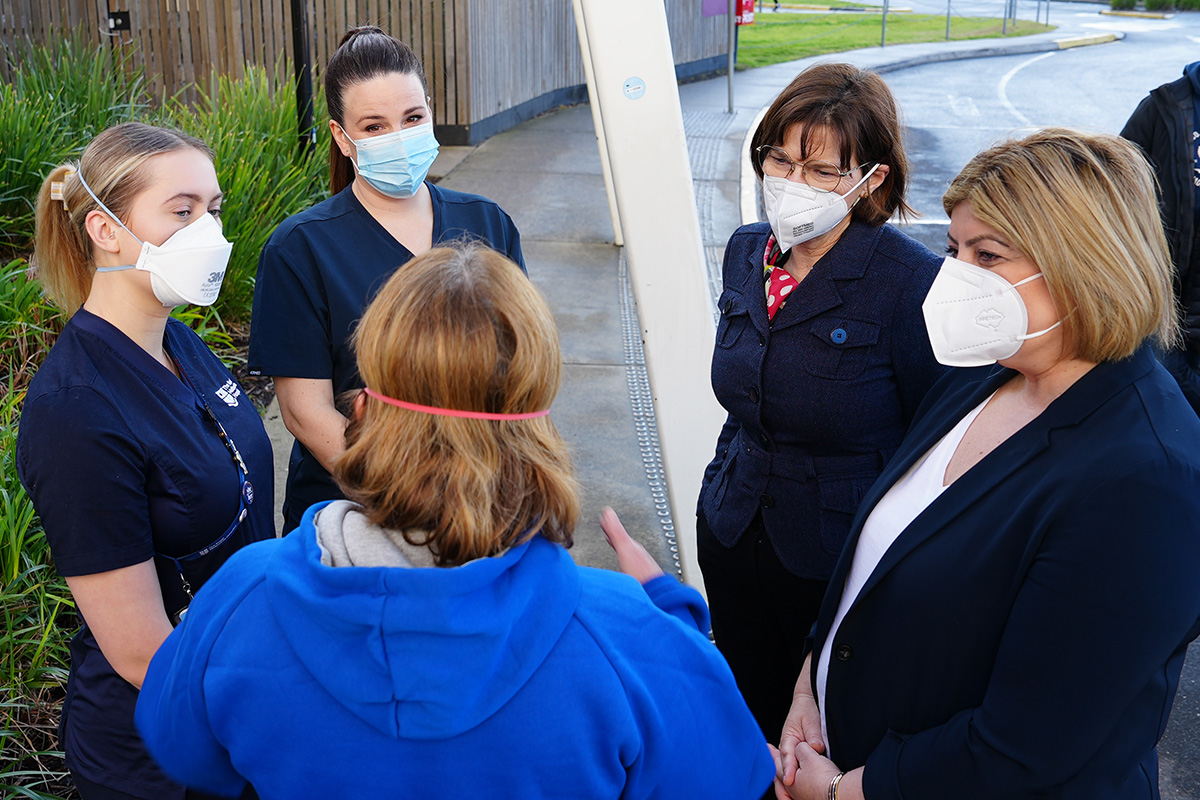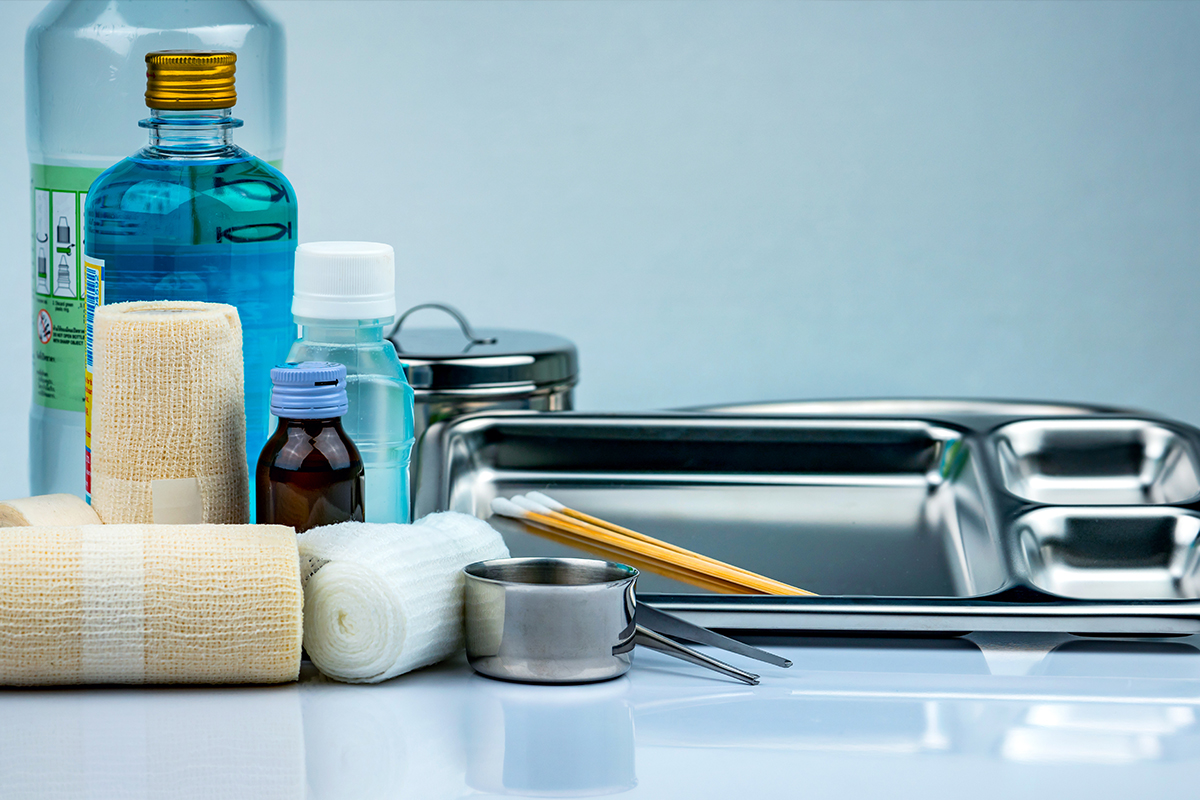
Lisa Fitzpatrick (back to camera) with grad nurse Robyn Dutli, RUSOM Dioni Wilson, Victorian Minister for Health Mary-Anne Thomas and Natalie Suleyman, MP for St Albans
More Registered Undergraduate Students of Nursing (RUSONs) and Registered Undergraduate Students of Midwifery (RUSOMs) are on their way to the state’s hospitals to help out.
As part of the Victorian Budget for the 2022/23 financial year, the Andrews Labor Government invested $59 million to fund another 1125 RUSON positions per year for two years, and $9.8 million to fund 75 further RUSOM positions.
RUSONs and RUSOMs have been a significant asset in the state’s pandemic response, and on Sunday 24 July the premier announced this latest round of funding would see student nurses and midwives working across even more public hospitals and health services throughout the state.
Since an initial trial at Monash Health, Alfred Health and Eastern Health in 2016, the RUSON/M student employment model has seen 3000 students working in an ever-growing number of hospitals across Victoria.
ANMF (Vic Branch) has received consistent positive feedback about the student employment model – from experienced nurses and midwives, as well as from students – suggesting that the support provided by RUSONs and RUSOMs, since 2020 in particular, has been invaluable to their colleagues, while also providing students with critical practical experience as they study.
Through this feedback, we know the model is helping students to complete their degrees with greater levels of confidence; likewise, it is reducing transition shock. It is therefore part of a long-term investment in building, and retaining, workforce capacity.
‘It’s no point us continuing to train record numbers of nurses and midwives if we can’t retain them.’ – ANMF Branch secretary Lisa Fitzpatrick
‘It’s no point us continuing to train record numbers of nurses and midwives if we can’t retain them,’ ANMF Branch secretary Lisa Fitzpatrick said at Sunday’s announcement. ‘One of the things that we’re seeing now with this program is the confidence and the skill that these new graduates are coming to the workforce with. They’re very much workforce ready.
‘We’ve now got over 50 health services who are employing these wonderful undergraduate students of nursing and midwifery, with each student now accruing annual leave, personal leave, long service leave, and being part of the nursing and midwifery team, providing extraordinary care – to their limit.
‘The ANMF looks forward to these RUSON/Ms returning to always being in addition to ratios when COVID illness and personal leave decrease in the future.’
Students speak
Speaking at the launch, former RUSON Robyn Dutli, currently in her graduate year at Royal Melbourne Hospital, reiterated the benefits of the model. ‘What was most beneficial for me, being a RUSON, was becoming more confident in my skills, more confident in my communication, and getting used to a hospital dynamic.
‘As a nursing student, when you’re on placement you’re only there for a short period of time and you’re not really able to make relationships. As a RUSON, you’re hired as a valued team member, you have more autonomy, you can build skills, you can work within a collaborative, multidisciplinary team. You get to assist nurses, enabling them to be where they need to be while we do the little jobs like stocking up or taking vital signs.’
Alana Hrehoresen, currently a second-year RUSON at Western Health, spoke to another benefit of the model: ‘I know that nursing isn’t for everybody, and I do know some people who have become a RUSON or a RUSOM and discovered that they have not enjoyed the job. But it’s helped me and a lot of other people I know decide that yes, this is definitely something that I want to do. It’s good to know that early on in your career.’
Final-year midwifery student Dioni Wilson, a RUSOM at Werribee Mercy Hospital, spoke to the benefits for both students and mothers. As a RUSOM, she said, she has the time offer help with breastfeeding in the first few days, for instance.
‘Obviously hospital stays have become a bit shorter and the midwives have a lot of other things to do, so to be able to sit with a woman and help her start her breastfeeding journey is one of the main things that we have been doing. The thanks that we get from these women [is wonderful]. They know that everyone is busy and we just have that extra time. And it’s great for our learning as well.’
Complete the student nurse employment survey
Current graduate nurses are encouraged to complete the graduate nurses survey being conducted by University of Melbourne masters student Libby Muir. Ms Muir’s research is looking at the student nurse employment experience, to quantify the influence that working in their chosen field while studying may have had on students’ learning and confidence.
The survey, which has human research ethics approval from the university, should take 10 to 15 minutes to complete, and those who complete it have the opportunity to go into the draw to win $100.



